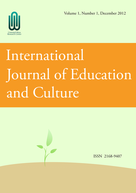


Volume 13 Issues 3-4 (2024-12-31)
Volume 13 Issues 1-2 (2024-06-30)
Volume 12 Issues 3-4 (2023-12-31)
Volume 12 Issues 1-2 (2023-06-30)
Volume 10 Issues 1&2 (2021-06-30)
Volume 9 Issues 3&4 (2020-12-31)
Volume 9 Issues 1&2 (2020-06-30)
Volume 8 Issues 3&4 (2019-12-31)
Volume 8 Issues 1&2 (2019-06-30)
Volume 7 Issues 3&4 (2018-12-31)
Volume 7 Issues 1&2 (2018-06-30)
Volume 6 Issues 3&4 (2017-12-31)
Volume 6 Issues 1&2 (2017-06-30)
Volume 5 Issues 3&4 (2016-12-31)
Volume 5 Issues 1&2 (2016-06-30)
Volume 4 Issues 3&4 (2015-12-31)
This article discusses the three major indicators of quality of an educational assessment. In an educational assessment, reliability, validity, and fairness are the three major indicators of its quality. A high-quality assessment, therefore, should be reliable, valid, and fair (AERA et al., 1999; Joint Committee on Testing Practices, 2004; Joint Advisory Committee, 1993; Popham, 2008, 2011). This article first explains the concepts of reliability, validity, and fairness in educational assessments. It then discusses fairness issues in both classroom and large-scale standardized assessment contexts. Finally, this article explores the relationships among reliability, validity, and fairness.
This study analyzes diversity and inclusion across a sample of educational institutions in Ontario. Concepts developed by Mor Barak (2011) were used as a foundation for the researchers’ framework that is centered on the Inclusion Skills Measurement Profile (ISM) developed by Turnbull, Greenwood, Tworoger, and Golden (2010) to examine a spectrum of criteria considered to be indicators of organizational diversity.